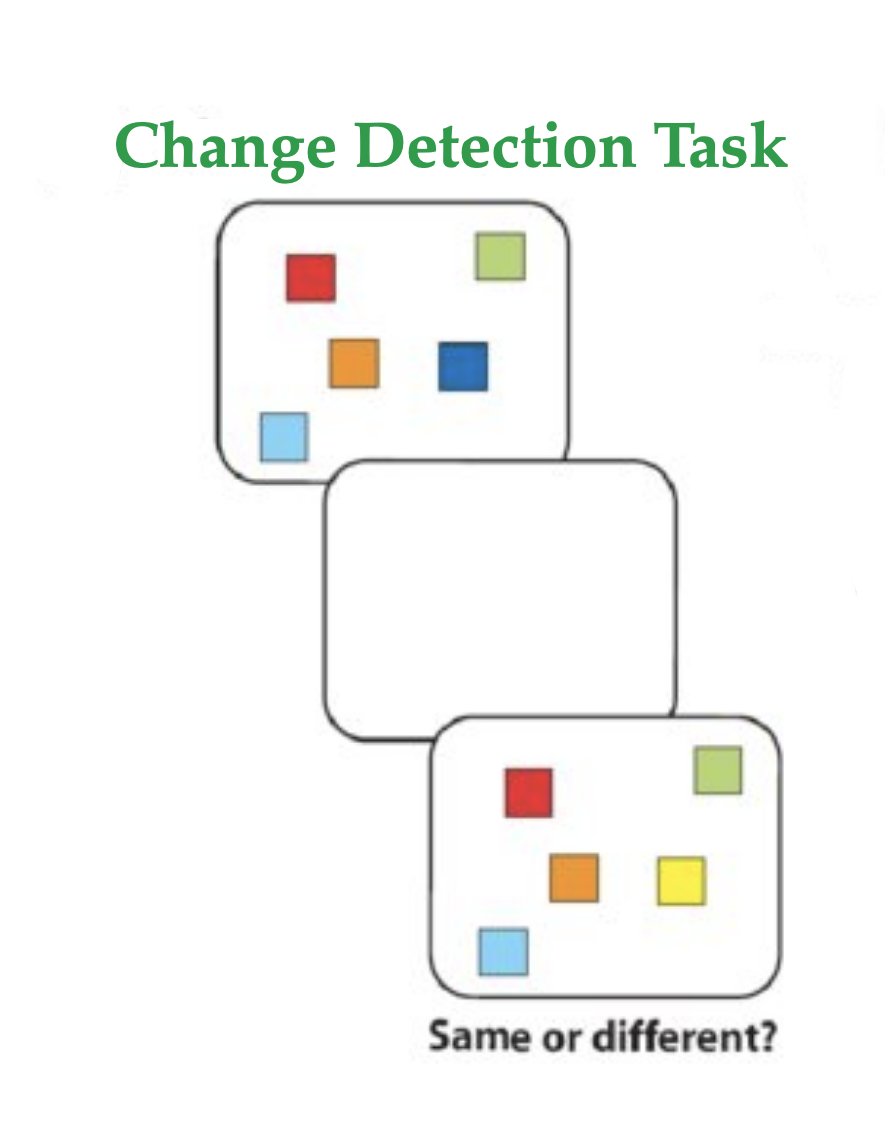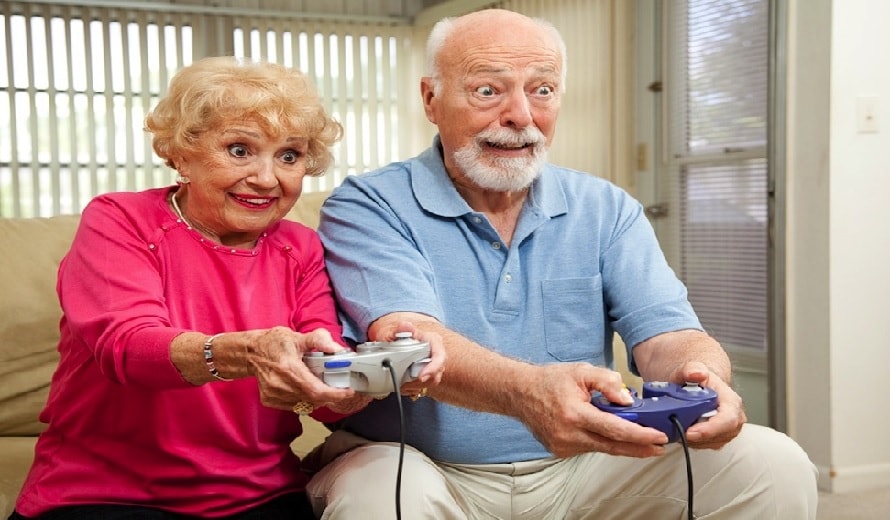Cognition and tech: Positive effects
Positive effects of digital technology on memory
After completing this lesson, you should be able to:
- Explain and evaluate research that investigates the potentially positive effects of technology on memory.
- Discuss the limitations of research on the use of technology.
At the end of this unit, you should be able to discuss the following concepts:
- Change detection task
- Single-blind control
- Visual working memory
The counter-argument
Although there is a lot of research out there that shows the negative effects of technology on cognitive processes, there are also several studies that show that the use of technology can help to improve some aspects of cognition. Before reading the study below, watch this video which shows a similar study to the one by Blacker et al (2014). The study being discussed in the video can be accessed here.
Read the summary of the study below and then answer the questions. Try to answer the questions in your notebook before looking at the answers that are provided.
Blacker et al (2014) used a self-selected sample of 34 male university students to study whether playing video games could help develop visual working memory. The participants were randomly allocated to one of two conditions:
- Action game condition: asked to play an action game like Modern Warfare in single-player mode
- Non-action game condition: asked to play Sims City. This served as the control group.
 Participants were asked to try to develop their skills for at least one hour a day for 30 days. Both before the training began and after it was completed, the participants were asked how motivated they were to play and their level of enjoyment. In addition, both before and after the training, the participants' visual working memory was tested by giving them a change detection task.
Participants were asked to try to develop their skills for at least one hour a day for 30 days. Both before the training began and after it was completed, the participants were asked how motivated they were to play and their level of enjoyment. In addition, both before and after the training, the participants' visual working memory was tested by giving them a change detection task.
As you can see to the left, the participant is first given a series of colour blocks that they are asked to remember. They will see this card for 3 - 5 seconds. They will then be shown a blank card for the same length of time. They are then shown the final card and asked whether the pattern is the same or different.
The study found that although both groups had the same level of motivation and both improved in their game performance over time, the action game participants demonstrated a significant improvement in the change-detection task, while the non-action game participants did not.
Checking for understanding: Blacker et al (2014)
1. What is one limitation of the choice of sample for this study?
It is a self-selected study, so they may be more motivated to do well and expectancy effects may play a role in the findings. Also, the study is all male. This is a gender bias. Although it may be true that most action gamers are male, it does not allow us to generalize the findings for cognitive improvement. In addition, the sample is made up of university students. This assumes that they have a certain level of cognitive ability already and this may not be representative of the general population.
2. What is the independent variable in this study?
Technically, whether the game is an "action" game or not. But the question, of course, is what is the variable that is actually important here? The researchers argue that increased attention is required to play the game and this may be what increases visual working memory.
3. Why was motivation measured in this study?
It is important to make sure that the control group did not lose motivation during the study as this would hurt their level of attention, which may, in turn, affect their visual working memory.
4. Besides the sampling issues outlined in question 1, what is one limitation of this study?
The use of an independent samples design means that participant variability may have played a role. In addition, the sample size is very small, so this study would need to be replicated to make sure that the results are reliable. Since the participants were asked to play on their own at home, there is no control over their actual effort except to trust that they did what they say they did. This lowers the internal validity of the study. Finally, there was no follow-up study to determine if the effects observed in the study were long-term and would continue after they had discontinued playing the game.
Further research
One of the key areas of research on the effect of digital technology on cognition is in the study of cognitive skills in older adults. One of the arguments is that the use of technology may lead to greater brain activity in their younger years which may act as a preventative factor as they age.
Small et al (2009) carried out a study with 24 healthy participants (age 55 - 76). 12 of the participants had minimal Internet search engine experience (what he called the "Net Naive group") and 12 had a good level of experience with Internet searching (the Net Savvy group). The team carried out an fMRI scan while participants were asked to carry out two tasks. The control task was to read text from a computer screen. The other task was to carry out an Internet search. In the video below, you can see the results of the study.
Notice that there was no significant difference in the two groups for brain activity during the text reading task. However, the Net Savvy group demonstrated significant increases in activity in regions controlling decision making, complex reasoning, and vision during the Internet search task. These findings suggest that in middle-aged and older adults, prior experience with Internet searching may alter the brain's responsiveness in neural circuits controlling decision making and complex reasoning. Further research is necessary to know if the use of the Internet may serve as a protective factor against cognitive decline.
Evaluating Small et al (2009): True or false
Decide whether each of the following statements is true or false. Be able to justify your answer before checking the response.
1. The study was a true experiment.
False. The study was a quasi-experiment. The participants could not be randomly allocated to conditions. They were allocated based on their history of Internet use.
2. The study lacks ecological validity.
True. Asking people to either read a text or carry out an Internet search while in an fMRI is highly artificial and may not be generalizable to day-to-day activity.
3. The study has high construct validity.
False. The researchers make an assumption that "activity" seen in certain parts of the brain reflects cognitive processing. It is not really possible from the study to know exactly what each part of the brain is doing while carrying out the Internet search. We make assumptions based on past research. The researchers also draw conclusions about the importance of this data for older adults which may not end up being supported.
4. The study's findings are reliable.
False. The sample size is very small and the study has not been replicated.
5. The study is open to researcher bias.
True. Since the study was not done using a single-blind control, there is a potential for researcher bias.
McAvinue et al (2013) investigated the effect of an online cognitive training program on the working memory of older adults. The researchers developed a 5-week online training program with the goal of improving both auditory and visuospatial working memory. The sample was made up of 36 older adults between the ages of 64 and 79. They were randomly allocated to one of two conditions.
Treatment group: The adaptive training program. This online program was a game that increased in difficulty as participants completed each level. The cognitive effort required for each level increased.
Control group: The non-adaptive training program. This online program stayed at a very simple level for the entire period of the study. The tasks were designed so as to not require a lot of cognitive effort.
The participants took a battery of cognitive tests both before and after training - and then after 3 and 6 months. The research found that there was an increase in the treatment group's auditory short-term memory span - that is, they could recall and repeat more digits after hearing them spoken than they could before the training. This was also true six months later. However, there was no significant improvement in working memory.
 Walter et al (2015) studied 28 healthy older adults (17 female and 11 male) between the ages of fifty-five and seventy-eight. All participants went through a battery of cognitive tests to measure their working memory, executive functions, and processing speed. They were then randomly allocated to either a computerized cognitive training program called "My Brain Trainer" or a simple reaction time training program. They were asked to spend 20 minutes a day using the program over a period of 28 days. If you want to see what the tasks were on the brain trainer, click here.
Walter et al (2015) studied 28 healthy older adults (17 female and 11 male) between the ages of fifty-five and seventy-eight. All participants went through a battery of cognitive tests to measure their working memory, executive functions, and processing speed. They were then randomly allocated to either a computerized cognitive training program called "My Brain Trainer" or a simple reaction time training program. They were asked to spend 20 minutes a day using the program over a period of 28 days. If you want to see what the tasks were on the brain trainer, click here.
The researchers used a single-blind control when analyzing the post-treatment data. The data showed that both groups increased their processing speed. However, it was the online cognitive training group that showed significant improvement in memory accuracy - that is, visual working memory.
Checking for understanding
Choose one of the two studies above - either McAvinue et al (2013) or Walter et al (2015). Write a paragraph that evaluates one of the two studies. The studies are already summarized above, so you do not have to summarize them again. Instead, if you were writing an essay to evaluate research on the positive effects of digital technology on cognitive processes, how would you evaluate the study?
Continue to Cognition and Tech: Emotion and cognition

 IB Docs (2) Team
IB Docs (2) Team

